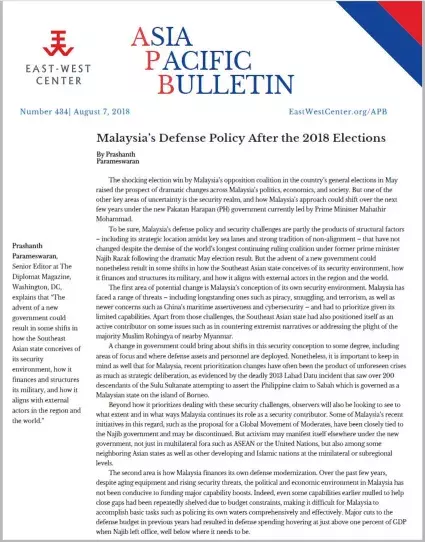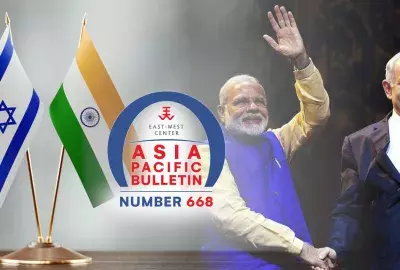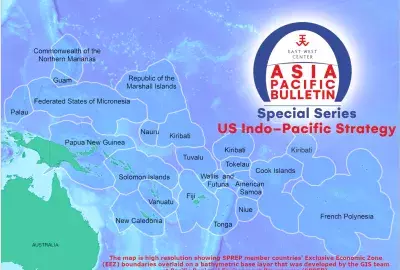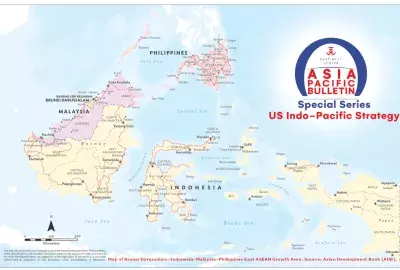Error message
Asia Pacific Bulletin
Asia Pacific Bulletin
Malaysia’s Defense Policy After the 2018 Elections
Malaysia’s Defense Policy After the 2018 Elections

|
Prashanth Parameswaran, Senior Editor at The Diplomat Magazine, Washington, DC, explains that “The advent of a new government could result in some shifts in how the Southeast Asian state conceives of its security environment, how it finances and structures its military, and how it aligns with external actors in the region and the world.” |
The shocking election win by Malaysia’s opposition coalition in the country’s general elections in May raised the prospect of dramatic changes across Malaysia’s politics, economics, and society. But one of the other key areas of uncertainty is the security realm, and how Malaysia’s approach could shift over the next few years under the new Pakatan Harapan (PH) government currently led by Prime Minister Mahathir Mohammad.
To be sure, Malaysia’s defense policy and security challenges are partly the products of structural factors – including its strategic location amidst key sea lanes and strong tradition of non-alignment – that have not changed despite the demise of the world’s longest continuing ruling coalition under former prime minister Najib Razak following the dramatic May election result. But the advent of a new government could nonetheless result in some shifts in how the Southeast Asian state conceives of its security environment, how it finances and structures its military, and how it aligns with external actors in the region and the world.
The first area of potential change is Malaysia’s conception of its own security environment. Malaysia has faced a range of threats – including longstanding ones such as piracy, smuggling, and terrorism, as well as newer concerns such as China’s maritime assertiveness and cybersecurity – and had to prioritize given its limited capabilities. Apart from those challenges, the Southeast Asian state had also positioned itself as an active contributor on some issues such as in countering extremist narratives or addressing the plight of the majority Muslim Rohingya of nearby Myanmar.
A change in government could bring about shifts in this security conception to some degree, including areas of focus and where defense assets and personnel are deployed. Nonetheless, it is important to keep in mind as well that for Malaysia, recent prioritization changes have often been the product of unforeseen crises as much as strategic deliberation, as evidenced by the deadly 2013 Lahad Datu incident that saw over 200 descendants of the Sulu Sultanate attempting to assert the Philippine claim to Sabah which is governed as a Malaysian state on the island of Borneo.
Beyond how it prioritizes dealing with these security challenges, observers will also be looking to see to what extent and in what ways Malaysia continues its role as a security contributor. Some of Malaysia’s recent initiatives in this regard, such as the proposal for a Global Movement of Moderates, have been closely tied to the Najib government and may be discontinued. But activism may manifest itself elsewhere under the new government, not just in multilateral fora such as ASEAN or the United Nations, but also among some neighboring Asian states as well as other developing and Islamic nations at the minilateral or subregional levels.
The second area is how Malaysia finances its own defense modernization. Over the past few years, despite aging equipment and rising security threats, the political and economic environment in Malaysia has not been conducive to funding major capability boosts. Indeed, even some capabilities earlier mulled to help close gaps had been repeatedly shelved due to budget constraints, making it difficult for Malaysia to accomplish basic tasks such as policing its own waters comprehensively and effectively. Major cuts to the defense budget in previous years had resulted in defense spending hovering at just above one percent of GDP when Najib left office, well below where it needs to be.
So far, the attention by the new government has been more on how money has been spent in the past rather than how it will spend it in the future, with moves such as the reviewing major procurements and reducing waste and redundancy. As welcome as such accountability may be, following through may be more difficult than initially realized, especially in areas such as welfare which are typically more politically sensitive. Before too long, the focus will also shift to the new government’s own funding priorities and how that affects the individual services, including the Air Force and Navy which have already been suffering from years of funding constraints.
The third area is how the government will deal with the country’s alignments with neighboring states as well as with extraregional actors. Malaysia for most of its independence has tended to adopt a posture of equidistance between the major powers to meet its defense needs and preserve its interests, whether it be managing transnational threats or territorial and maritime disputes. Under Najib, Malaysian defense policy saw some continuity but also areas of change, most significantly in terms of the further intensification of ties with major powers such as the United States, China, and Japan, as well as concerted attempts to better manage issues with neighbors like Singapore and the Philippines.
With a new government now in power, a key question is where there will be change amid the continuity. Most of the attention so far has been on how Malaysia’s ties with the United States and China may play out. Mahathir’s previous tenure saw more of a disjuncture between public acrimony and private cooperation when it came to defense ties with Washington, while relations with Beijing were close but not nearly as warm as they were under Najib. Thus far, the government has treaded lightly on this front, engaging other major powers including not just the United States and China but also Japan and India while at the same time emphasizing that Malaysia will stick to its approach to neutrality and does not want to see major power competition play out in areas such as the South China Sea.
Equally, if not more important, will be how Malaysia’s security ties with its neighbors play out. Already, some of Mahathir’s rhetoric, such as on Malaysia expanding its presence in areas close to disputed territories with Singapore, has raised questions about a return to tensions. But on the flip side, there could also be room for greater collaboration if the new government finds solidary with other fellow ASEAN countries on other areas (such as addressing specific maritime threats or strengthening the regional security architecture to better manage great power competition). Under the new government, we have seen not only suggestions about the continuation of initiatives such as patrols with Indonesia and the Philippines in the Sulu Sea, but also references to old proposals previously advanced by Malaysia, such as the Zone of Peace, Freedom and Neutrality (ZOPFAN) to keep the region free from external powers.
Given that we are only a few months into a new government following a historic election, it is still too early to truly assess where Malaysia’s defense policy is headed. With so much on the government’s plate domestically, it may be a while before we begin to see clear lines emerge on foreign and security policy, including some unexpected developments. Some of the officials and their personnel will also need time to settle in their roles. As things begin to cohere, how Malaysia thinks, finances, and aligns on security matters will no doubt be important to watch.
To be sure, Malaysia’s defense policy and security challenges are partly the products of structural factors – including its strategic location amidst key sea lanes and strong tradition of non-alignment – that have not changed despite the demise of the world’s longest continuing ruling coalition under former prime minister Najib Razak following the dramatic May election result. But the advent of a new government could nonetheless result in some shifts in how the Southeast Asian state conceives of its security environment, how it finances and structures its military, and how it aligns with external actors in the region and the world.
The first area of potential change is Malaysia’s conception of its own security environment. Malaysia has faced a range of threats – including longstanding ones such as piracy, smuggling, and terrorism, as well as newer concerns such as China’s maritime assertiveness and cybersecurity – and had to prioritize given its limited capabilities. Apart from those challenges, the Southeast Asian state had also positioned itself as an active contributor on some issues such as in countering extremist narratives or addressing the plight of the majority Muslim Rohingya of nearby Myanmar.
A change in government could bring about shifts in this security conception to some degree, including areas of focus and where defense assets and personnel are deployed. Nonetheless, it is important to keep in mind as well that for Malaysia, recent prioritization changes have often been the product of unforeseen crises as much as strategic deliberation, as evidenced by the deadly 2013 Lahad Datu incident that saw over 200 descendants of the Sulu Sultanate attempting to assert the Philippine claim to Sabah which is governed as a Malaysian state on the island of Borneo.
Beyond how it prioritizes dealing with these security challenges, observers will also be looking to see to what extent and in what ways Malaysia continues its role as a security contributor. Some of Malaysia’s recent initiatives in this regard, such as the proposal for a Global Movement of Moderates, have been closely tied to the Najib government and may be discontinued. But activism may manifest itself elsewhere under the new government, not just in multilateral fora such as ASEAN or the United Nations, but also among some neighboring Asian states as well as other developing and Islamic nations at the minilateral or subregional levels.
The second area is how Malaysia finances its own defense modernization. Over the past few years, despite aging equipment and rising security threats, the political and economic environment in Malaysia has not been conducive to funding major capability boosts. Indeed, even some capabilities earlier mulled to help close gaps had been repeatedly shelved due to budget constraints, making it difficult for Malaysia to accomplish basic tasks such as policing its own waters comprehensively and effectively. Major cuts to the defense budget in previous years had resulted in defense spending hovering at just above one percent of GDP when Najib left office, well below where it needs to be.
So far, the attention by the new government has been more on how money has been spent in the past rather than how it will spend it in the future, with moves such as the reviewing major procurements and reducing waste and redundancy. As welcome as such accountability may be, following through may be more difficult than initially realized, especially in areas such as welfare which are typically more politically sensitive. Before too long, the focus will also shift to the new government’s own funding priorities and how that affects the individual services, including the Air Force and Navy which have already been suffering from years of funding constraints.
The third area is how the government will deal with the country’s alignments with neighboring states as well as with extraregional actors. Malaysia for most of its independence has tended to adopt a posture of equidistance between the major powers to meet its defense needs and preserve its interests, whether it be managing transnational threats or territorial and maritime disputes. Under Najib, Malaysian defense policy saw some continuity but also areas of change, most significantly in terms of the further intensification of ties with major powers such as the United States, China, and Japan, as well as concerted attempts to better manage issues with neighbors like Singapore and the Philippines.
With a new government now in power, a key question is where there will be change amid the continuity. Most of the attention so far has been on how Malaysia’s ties with the United States and China may play out. Mahathir’s previous tenure saw more of a disjuncture between public acrimony and private cooperation when it came to defense ties with Washington, while relations with Beijing were close but not nearly as warm as they were under Najib. Thus far, the government has treaded lightly on this front, engaging other major powers including not just the United States and China but also Japan and India while at the same time emphasizing that Malaysia will stick to its approach to neutrality and does not want to see major power competition play out in areas such as the South China Sea.
Equally, if not more important, will be how Malaysia’s security ties with its neighbors play out. Already, some of Mahathir’s rhetoric, such as on Malaysia expanding its presence in areas close to disputed territories with Singapore, has raised questions about a return to tensions. But on the flip side, there could also be room for greater collaboration if the new government finds solidary with other fellow ASEAN countries on other areas (such as addressing specific maritime threats or strengthening the regional security architecture to better manage great power competition). Under the new government, we have seen not only suggestions about the continuation of initiatives such as patrols with Indonesia and the Philippines in the Sulu Sea, but also references to old proposals previously advanced by Malaysia, such as the Zone of Peace, Freedom and Neutrality (ZOPFAN) to keep the region free from external powers.
Given that we are only a few months into a new government following a historic election, it is still too early to truly assess where Malaysia’s defense policy is headed. With so much on the government’s plate domestically, it may be a while before we begin to see clear lines emerge on foreign and security policy, including some unexpected developments. Some of the officials and their personnel will also need time to settle in their roles. As things begin to cohere, how Malaysia thinks, finances, and aligns on security matters will no doubt be important to watch.
|
Prashanth Parameswaran, Senior Editor at The Diplomat Magazine, Washington, DC, explains that “The advent of a new government could result in some shifts in how the Southeast Asian state conceives of its security environment, how it finances and structures its military, and how it aligns with external actors in the region and the world.” |
The shocking election win by Malaysia’s opposition coalition in the country’s general elections in May raised the prospect of dramatic changes across Malaysia’s politics, economics, and society. But one of the other key areas of uncertainty is the security realm, and how Malaysia’s approach could shift over the next few years under the new Pakatan Harapan (PH) government currently led by Prime Minister Mahathir Mohammad.
To be sure, Malaysia’s defense policy and security challenges are partly the products of structural factors – including its strategic location amidst key sea lanes and strong tradition of non-alignment – that have not changed despite the demise of the world’s longest continuing ruling coalition under former prime minister Najib Razak following the dramatic May election result. But the advent of a new government could nonetheless result in some shifts in how the Southeast Asian state conceives of its security environment, how it finances and structures its military, and how it aligns with external actors in the region and the world.
The first area of potential change is Malaysia’s conception of its own security environment. Malaysia has faced a range of threats – including longstanding ones such as piracy, smuggling, and terrorism, as well as newer concerns such as China’s maritime assertiveness and cybersecurity – and had to prioritize given its limited capabilities. Apart from those challenges, the Southeast Asian state had also positioned itself as an active contributor on some issues such as in countering extremist narratives or addressing the plight of the majority Muslim Rohingya of nearby Myanmar.
A change in government could bring about shifts in this security conception to some degree, including areas of focus and where defense assets and personnel are deployed. Nonetheless, it is important to keep in mind as well that for Malaysia, recent prioritization changes have often been the product of unforeseen crises as much as strategic deliberation, as evidenced by the deadly 2013 Lahad Datu incident that saw over 200 descendants of the Sulu Sultanate attempting to assert the Philippine claim to Sabah which is governed as a Malaysian state on the island of Borneo.
Beyond how it prioritizes dealing with these security challenges, observers will also be looking to see to what extent and in what ways Malaysia continues its role as a security contributor. Some of Malaysia’s recent initiatives in this regard, such as the proposal for a Global Movement of Moderates, have been closely tied to the Najib government and may be discontinued. But activism may manifest itself elsewhere under the new government, not just in multilateral fora such as ASEAN or the United Nations, but also among some neighboring Asian states as well as other developing and Islamic nations at the minilateral or subregional levels.
The second area is how Malaysia finances its own defense modernization. Over the past few years, despite aging equipment and rising security threats, the political and economic environment in Malaysia has not been conducive to funding major capability boosts. Indeed, even some capabilities earlier mulled to help close gaps had been repeatedly shelved due to budget constraints, making it difficult for Malaysia to accomplish basic tasks such as policing its own waters comprehensively and effectively. Major cuts to the defense budget in previous years had resulted in defense spending hovering at just above one percent of GDP when Najib left office, well below where it needs to be.
So far, the attention by the new government has been more on how money has been spent in the past rather than how it will spend it in the future, with moves such as the reviewing major procurements and reducing waste and redundancy. As welcome as such accountability may be, following through may be more difficult than initially realized, especially in areas such as welfare which are typically more politically sensitive. Before too long, the focus will also shift to the new government’s own funding priorities and how that affects the individual services, including the Air Force and Navy which have already been suffering from years of funding constraints.
The third area is how the government will deal with the country’s alignments with neighboring states as well as with extraregional actors. Malaysia for most of its independence has tended to adopt a posture of equidistance between the major powers to meet its defense needs and preserve its interests, whether it be managing transnational threats or territorial and maritime disputes. Under Najib, Malaysian defense policy saw some continuity but also areas of change, most significantly in terms of the further intensification of ties with major powers such as the United States, China, and Japan, as well as concerted attempts to better manage issues with neighbors like Singapore and the Philippines.
With a new government now in power, a key question is where there will be change amid the continuity. Most of the attention so far has been on how Malaysia’s ties with the United States and China may play out. Mahathir’s previous tenure saw more of a disjuncture between public acrimony and private cooperation when it came to defense ties with Washington, while relations with Beijing were close but not nearly as warm as they were under Najib. Thus far, the government has treaded lightly on this front, engaging other major powers including not just the United States and China but also Japan and India while at the same time emphasizing that Malaysia will stick to its approach to neutrality and does not want to see major power competition play out in areas such as the South China Sea.
Equally, if not more important, will be how Malaysia’s security ties with its neighbors play out. Already, some of Mahathir’s rhetoric, such as on Malaysia expanding its presence in areas close to disputed territories with Singapore, has raised questions about a return to tensions. But on the flip side, there could also be room for greater collaboration if the new government finds solidary with other fellow ASEAN countries on other areas (such as addressing specific maritime threats or strengthening the regional security architecture to better manage great power competition). Under the new government, we have seen not only suggestions about the continuation of initiatives such as patrols with Indonesia and the Philippines in the Sulu Sea, but also references to old proposals previously advanced by Malaysia, such as the Zone of Peace, Freedom and Neutrality (ZOPFAN) to keep the region free from external powers.
Given that we are only a few months into a new government following a historic election, it is still too early to truly assess where Malaysia’s defense policy is headed. With so much on the government’s plate domestically, it may be a while before we begin to see clear lines emerge on foreign and security policy, including some unexpected developments. Some of the officials and their personnel will also need time to settle in their roles. As things begin to cohere, how Malaysia thinks, finances, and aligns on security matters will no doubt be important to watch.
To be sure, Malaysia’s defense policy and security challenges are partly the products of structural factors – including its strategic location amidst key sea lanes and strong tradition of non-alignment – that have not changed despite the demise of the world’s longest continuing ruling coalition under former prime minister Najib Razak following the dramatic May election result. But the advent of a new government could nonetheless result in some shifts in how the Southeast Asian state conceives of its security environment, how it finances and structures its military, and how it aligns with external actors in the region and the world.
The first area of potential change is Malaysia’s conception of its own security environment. Malaysia has faced a range of threats – including longstanding ones such as piracy, smuggling, and terrorism, as well as newer concerns such as China’s maritime assertiveness and cybersecurity – and had to prioritize given its limited capabilities. Apart from those challenges, the Southeast Asian state had also positioned itself as an active contributor on some issues such as in countering extremist narratives or addressing the plight of the majority Muslim Rohingya of nearby Myanmar.
A change in government could bring about shifts in this security conception to some degree, including areas of focus and where defense assets and personnel are deployed. Nonetheless, it is important to keep in mind as well that for Malaysia, recent prioritization changes have often been the product of unforeseen crises as much as strategic deliberation, as evidenced by the deadly 2013 Lahad Datu incident that saw over 200 descendants of the Sulu Sultanate attempting to assert the Philippine claim to Sabah which is governed as a Malaysian state on the island of Borneo.
Beyond how it prioritizes dealing with these security challenges, observers will also be looking to see to what extent and in what ways Malaysia continues its role as a security contributor. Some of Malaysia’s recent initiatives in this regard, such as the proposal for a Global Movement of Moderates, have been closely tied to the Najib government and may be discontinued. But activism may manifest itself elsewhere under the new government, not just in multilateral fora such as ASEAN or the United Nations, but also among some neighboring Asian states as well as other developing and Islamic nations at the minilateral or subregional levels.
The second area is how Malaysia finances its own defense modernization. Over the past few years, despite aging equipment and rising security threats, the political and economic environment in Malaysia has not been conducive to funding major capability boosts. Indeed, even some capabilities earlier mulled to help close gaps had been repeatedly shelved due to budget constraints, making it difficult for Malaysia to accomplish basic tasks such as policing its own waters comprehensively and effectively. Major cuts to the defense budget in previous years had resulted in defense spending hovering at just above one percent of GDP when Najib left office, well below where it needs to be.
So far, the attention by the new government has been more on how money has been spent in the past rather than how it will spend it in the future, with moves such as the reviewing major procurements and reducing waste and redundancy. As welcome as such accountability may be, following through may be more difficult than initially realized, especially in areas such as welfare which are typically more politically sensitive. Before too long, the focus will also shift to the new government’s own funding priorities and how that affects the individual services, including the Air Force and Navy which have already been suffering from years of funding constraints.
The third area is how the government will deal with the country’s alignments with neighboring states as well as with extraregional actors. Malaysia for most of its independence has tended to adopt a posture of equidistance between the major powers to meet its defense needs and preserve its interests, whether it be managing transnational threats or territorial and maritime disputes. Under Najib, Malaysian defense policy saw some continuity but also areas of change, most significantly in terms of the further intensification of ties with major powers such as the United States, China, and Japan, as well as concerted attempts to better manage issues with neighbors like Singapore and the Philippines.
With a new government now in power, a key question is where there will be change amid the continuity. Most of the attention so far has been on how Malaysia’s ties with the United States and China may play out. Mahathir’s previous tenure saw more of a disjuncture between public acrimony and private cooperation when it came to defense ties with Washington, while relations with Beijing were close but not nearly as warm as they were under Najib. Thus far, the government has treaded lightly on this front, engaging other major powers including not just the United States and China but also Japan and India while at the same time emphasizing that Malaysia will stick to its approach to neutrality and does not want to see major power competition play out in areas such as the South China Sea.
Equally, if not more important, will be how Malaysia’s security ties with its neighbors play out. Already, some of Mahathir’s rhetoric, such as on Malaysia expanding its presence in areas close to disputed territories with Singapore, has raised questions about a return to tensions. But on the flip side, there could also be room for greater collaboration if the new government finds solidary with other fellow ASEAN countries on other areas (such as addressing specific maritime threats or strengthening the regional security architecture to better manage great power competition). Under the new government, we have seen not only suggestions about the continuation of initiatives such as patrols with Indonesia and the Philippines in the Sulu Sea, but also references to old proposals previously advanced by Malaysia, such as the Zone of Peace, Freedom and Neutrality (ZOPFAN) to keep the region free from external powers.
Given that we are only a few months into a new government following a historic election, it is still too early to truly assess where Malaysia’s defense policy is headed. With so much on the government’s plate domestically, it may be a while before we begin to see clear lines emerge on foreign and security policy, including some unexpected developments. Some of the officials and their personnel will also need time to settle in their roles. As things begin to cohere, how Malaysia thinks, finances, and aligns on security matters will no doubt be important to watch.







